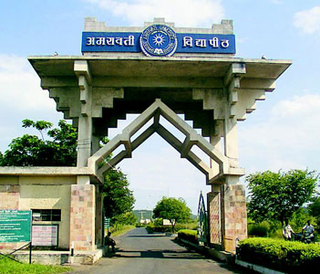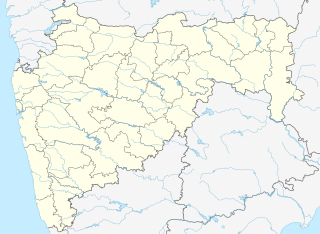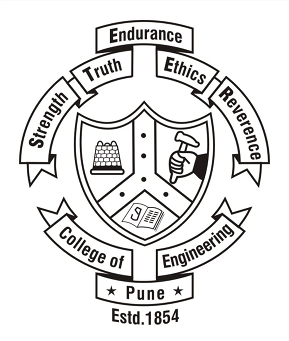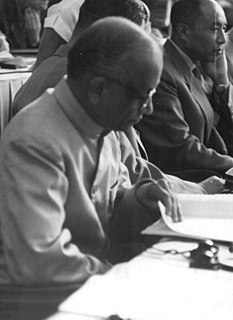
Shivaji University, established in 1962, is in Kolhapur, Maharashtra, India. The university's campus is 853 acres, and is named after Chhatrapati Shivaji Maharaj, founder of the Maratha Empire. It was inaugurated on 18 November 1962 by Sarvepalli Radhakrishnan, the then president of India. Yashwantrao Chavan and Balasaheb Desai took the lead in establishing this university. Kolhapur, Sangli, and Satara come under its jurisdiction with 279 affiliated colleges and recognised institutes. One of the major objectives behind its foundation was to cater to the regional needs of South Maharashtra. The University's efforts towards excellence are being recognised by the substantial grants received from funding agencies like University Grants Commission (India), Department of Science and Technology (India), and DBT.
MIT World Peace University is a state private university established under Government of Maharashtra Act No. XXXV 2017 and recognized by UGC. It is located in Kothrud Pune. It is a part of MIT Group of Institutes which provides schooling, distance education and professional courses in disciplines such as management, engineering, law, pharmacy, insurance, arts, commerce, science and photography.. The subsidiaries of the Group include MIT Pune, MIT Vishwashanti Gurukul, MIT School of Distance Education and Avantika University.

Sant Gadge Baba Amravati University , named after Sant Gadge Baba, is a public state university located at Amravati in the Vidarbha region of the state of Maharashtra, India.
Sinhgad Technical Education Society (STES), is a group of educational institutes operating mainly in the region of Pune, India. It provides education in the fields of Engineering, Management, Pharmacy, Architecture, Health Science. The society also runs many schools. STES was founded by Prof. M. N. Navale in 1993 in response to the increasing education criteria in rapidly growing industry after the Open business strategy policy of Indian government.

Kothrud is a western suburb of the city of Pune, in the Indian state of Maharashtra. Originally a village, Kothrud experienced rapid growth in commercial and residential real estate. It was one of the fastest developing suburbs in Asia in the 1980s. Kothrud's real estate prices are high, making the suburb one of Pune's upmarket areas. Kothrud saw Pune's first fly-over, at Paud Phata, which connected Karve Road to Paud Road. Landmarks in Kothrud include the Mrityunjaya Temple dating to Peshwa times.

Hadapsar is an eastern suburb of Pune City in the Indian state of Maharashtra. Until 1990, Hadapsar was a small village surrounded by farms. It later developed into a major industrial area and is now one of the most densely populated areas of Pune District.

Dr. Balasaheb Sawant Konkan Krishi Vidyapeeth, formerly Konkan Krishi Vidyapeeth, is an agricultural university at Dapoli in ratnagiri district of the Indian state of Maharashtra. It was established on 18 May 1972 as Konkan Krishi Vidyapeeth, and got its present name on 12 February 2001. Its research centre at Karjat has developed some patented varieties of rice. Its major focus areas are rice, horticulture and fisheries. In 1997, it received the Best Institute Award of the Indian Council of Agricultural Research. Dr S. D. Sawant is the 14th Vice Chancellor of this University, he was appointed by Chancellor, CH. Vidyasagar Rao on 7 March 2019 for 5 years.
Sou. Venutai Chavan Polytechnic is a polytechnic college belonging to the Sinhgad Technical Education Society which imparts diploma education in engineering. It is located off Sinhgad Road in Vadgaon (Budruk), Pune. It was established in 1993 and was the first institute of STES. It offers diploma courses in the branches of Computer technology, Information Technology, Civil Engineering, Electronics and Telecommunication engineering, Applied Science and Mechanical engineering. It is assessed by the National Board of Accreditation, approved by the All India Council of Technical Education, Government of Maharashtra and affiliated to the Maharashtra State Board of Technical Education.

Bharati Vidyapeeth is a Deemed university and a group of higher educational institutions located in Pune, India. It was established in 1964 by Indian politician and educationist Patangrao Kadam. Bharati Vidyapeeth has campuses across the country at New Delhi, Navi Mumbai, Sangli, Pune, Solapur, Kolhapur, Karad, Satara, and Panchgani. It runs more than 78 schools and 60 institutions of higher education, including those of professional education. Among these are colleges of Medicine, Dentistry, Ayurveda, Homeopathy, Nursing, Pharmacy, Engineering, Management, Hotel Management, Catering Technology, Environment Science and Agriculture etc. On 26 April 1996 the Government of India, on the recommendation of the University Grants Commission, granted the status of "Deemed to be University" to a cluster of 12 institutions of Bharati Vidyapeeth.
G H Raisoni College of Engineering and Management (GHRCEM) is an Autonomous (B.Tech) educational institute located in Pune, India, which is affiliated to Pune University (SPPU). It offers Post-Graduate and Undergraduate degrees in the fields of computer, electronics and information technology and business administration and is part of the Raisoni Group of Institutions. It is approved by All India Council for Technical Education (AICTE).
AISSMS College of Pharmacy, Pune is a Pharmacy college affiliated to the AICTE, PCI, New Delhi and University of Pune, India. It was established in 1996. AISSMS COP is among the top Pharmacy colleges in the private sector in Maharashtra. AISSMS is an Institute founded by Chattrapati Shri Shahu Maharaj and H. H. Shri Madhavraoji Scindia. AISSMS college of Pharmacy is located close to the Regional Transport Office and shares its campus with an Engineering college and Business School. At present, the following courses are conducted at the institution-Bachelor of Pharmacy (B.Pharm),Masters in Pharmacy (M.Pharm). Recently AISSMS COP has been recognized as a PhD institute. The college is located on 72,000 sq. ft of land.
Sinhgad Institute Of Management, also referred as SIOM is a management institute operating in Vadgaon(Bk), Pune. It provides the education in management and computer application. SIOM was founded by Professor M.N.Navale in 1994 in response to the increasing education criteria in rapidly growing industry.
Vishwakarma University is located in Pune ,Maharashtra, India.
















